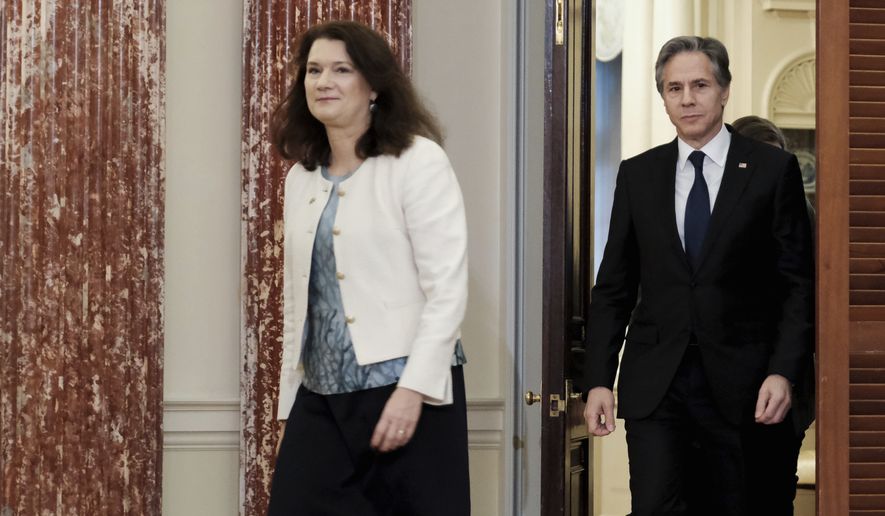Top Swedish officials visited Washington Wednesday as their country weighs whether to join NATO, a move that would ratchet up tensions with Moscow even higher while also exposing divisions across Europe over the future of the alliance and its proper role amid Russia’s war in Ukraine.
Secretary of State Antony Blinken — who tested positive for COVID-19 shortly after the meeting — conferred with visiting Swedish Foreign Minister Ann Linde at the State Department, while leading Swedish military officials spoke at a high-level U.S. defense industry conference in Washington. The visits were designed to send a clear message to the Kremlin, which hoped its invasion of Ukraine would break NATO solidarity and fracture an alliance wary of finding itself at war with Russia, the world’s leading nuclear power.
But the 30-nation NATO has remained largely unified. The West has mostly been in lockstep with an unprecedented series of economic sanctions aimed at top Russian companies and oligarchs. And perhaps even more importantly, both Sweden and Finland, long neutral, have said they’ll decide later this month whether to seek formal membership in NATO, which would dramatically enhance the alliance’s presence on Russia’s doorstep.
Ms. Linde did not directly address the looming NATO question during brief public remarks at the State Department, but she made clear the war in Ukraine is a game-changer for how her country views its 21st-century security status.
“It is actually a horrendous time with [the] Russian invasion of Ukraine, which has made all of us consider what is the most secure situation for our countries and our peoples,” she said.
“I also thank you for your leadership,” she told Mr. Blinken, “when it comes to sanctions against Russia because of the invasion of Ukraine. And that we have been able to keep so close, from Sweden, from EU, together with [the] U.S.”
But the prospect of Finland and Sweden, who are said to be considering a joint application by the end of this month, formally joining NATO has sparked controversy within those countries. Elsewhere in Europe, some officials are trying to use the issue as a bargaining chip for their own geopolitical aims.
Most notably, Croatian President Zoran Milanovic said this week he would seek to block both nations from becoming NATO members, according to European media reports.
The Croatian leader said he would stand in the way of NATO membership for Sweden and Finland unless the U.S. helps change election laws in neighboring Bosnia, the European news channel N1 reported this week.
Other leading Croatian officials, however, said the president does not have the authority to issue such a veto, and there was little sign Wednesday that his threats would amount to a serious roadblock.
But there are other potential hurdles. Leading Swedish officials also seem reluctant to join the alliance, signaling that they would prefer Stockholm to remain outside NATO and embrace a more neutral status amid the worsening relationship between Moscow and the West.
Annika Strandhall, Sweden’s climate and environment minister and also chair of the women’s wing of the Social Democrats, said her party will oppose the bid.
We “in the federal board have decided to remain in line with our congressional decisions that Sweden should be militarily non-aligned and stand outside NATO,” she said this week, according to Britain’s Guardian newspaper.
Sweden does not border Russia, but neighboring Finland shares an 833-mile boundary with Russia, meaning that the amount of NATO military forces and equipment in Moscow’s backyard could increase over the coming years. NATO Secretary-General Jens Stoltenberg said last month the decision to apply was up to individual countries, but suggested the Nordic countries’ bid would be very favorably received at NATO’s Brussels headquarters.
That possibility has led Russian officials to issue dire warnings to the West. Dmitry Medvedev, deputy chairman of Russia’s Security Council, suggested last month that an expansion of NATO could lead Moscow to openly deploy nuclear weapons to its Kaliningrad enclave, which lies between Lithuania and Poland.
“There can be no more talk of any nuclear-free status for the Baltic. The balance must be restored,” he said.
• Ben Wolfgang can be reached at bwolfgang@washingtontimes.com.




Please read our comment policy before commenting.